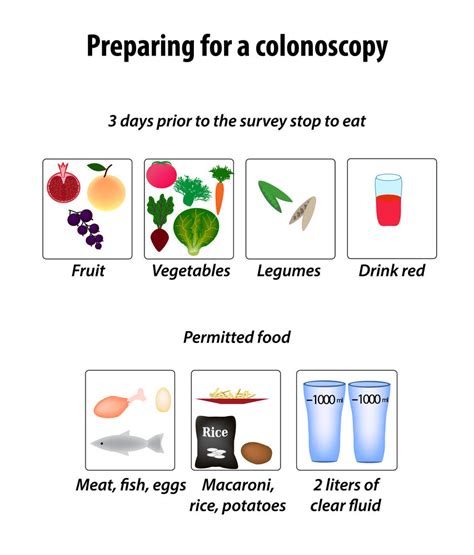Preparing For Colonoscopy

Colonoscopy, a medical procedure used to detect changes or abnormalities in the large intestine (colon) and rectum, is a crucial screening tool for colorectal cancer and other gastrointestinal issues. Preparing for a colonoscopy is essential to ensure the procedure’s effectiveness and your safety. The preparation process typically begins several days before the procedure and involves dietary changes, bowel preparation, and other steps to cleanse your colon.
One of the first steps in preparing for a colonoscopy is to understand the importance of a clear colon. A clean colon allows your doctor to see the inside of your colon clearly during the procedure, which is essential for detecting polyps, cancer, and other abnormalities. To achieve this, you will need to follow a special diet and use medications that will cleanse your colon.
Dietary Changes
Usually, 2 to 3 days before the procedure, you will be advised to start a low-fiber diet. This means avoiding foods that are high in fiber, such as whole grains, nuts, seeds, and certain fruits and vegetables. The goal is to reduce the amount of undigested food that reaches your colon, making it easier to cleanse.
Bowel Preparation
The most critical part of colonoscopy preparation is the bowel preparation, which usually starts the day before the procedure. You will be given a bowel prep medication by your doctor, which comes in the form of a liquid, tablet, or powder that you mix with water. The prep causes you to have diarrhea, so it’s essential to stay near a bathroom. The medication works by flushing out the contents of your colon, leaving it empty and clean for the procedure.
There are different types of bowel prep medications, and your doctor will choose the one that’s best for you based on your health and the type of procedure you’re having. It’s crucial to follow the instructions provided with your bowel prep carefully to ensure it works effectively.
Other Preparations
In addition to dietary changes and bowel preparation, there are other steps you might need to take:
- Hydration: It’s essential to drink plenty of clear liquids (like water, clear broth, or electrolyte-rich beverages) during the bowel prep to avoid dehydration.
- Medication Adjustments: You may need to stop taking certain medications, especially blood thinners, a few days before the procedure to reduce the risk of bleeding. Always consult with your doctor about which medications to stop and when.
- Transportation: Since you will be sedated during the procedure, you will need someone to drive you home afterward. Sedation can impair your judgment and reflexes, making it unsafe to drive.
The Day of the Procedure
On the day of your colonoscopy, you should:
- Arrive Early: Plan to arrive at least an hour before your scheduled procedure time to complete any last-minute paperwork and get settled.
- Wear Comfortable Clothing: Choose loose, comfortable clothing and avoid wearing jewelry, especially around your neck or fingers, as it may interfere with the equipment.
- Follow Instructions: Your healthcare team will give you specific instructions about what to expect during and after the procedure, including how long you will need to rest and when you can resume your normal activities.
After the Procedure
After the colonoscopy, you might feel a bit groggy from the sedation, and you may experience some gas or bloating due to the air inserted into your colon during the procedure. These side effects are usually mild and temporary. Your doctor will discuss the results of the procedure with you, including any findings, such as the presence of polyps, and recommend any follow-up actions.
FAQ Section
What happens if I don't follow the bowel prep instructions correctly?
+If you don't follow the bowel prep instructions correctly, your colon might not be fully cleaned, which could lead to the procedure being less effective or even rescheduled. It's crucial to adhere to the instructions given by your healthcare provider to ensure the best possible outcome.
How long does a colonoscopy take?
+The actual procedure typically takes about 30 to 60 minutes, but you should plan to spend several hours at the facility for preparation, the procedure itself, and recovery from the sedation.
Will I feel pain during the colonoscopy?
+You will be given sedation to help you relax and reduce any discomfort during the procedure. While you might feel some mild cramping or bloating due to the air inserted into your colon, the sedation should prevent you from feeling significant pain.
How often should I have a colonoscopy?
+The frequency of colonoscopies depends on your risk factors for colon cancer and other health conditions. Generally, individuals with an average risk of colorectal cancer should have a colonoscopy every 10 years starting at age 45. However, your doctor may recommend a different schedule based on your personal and family medical history.
Can I eat after the procedure?
+Yes, you can eat after the procedure, but it's recommended to start with light meals and gradually return to your normal diet. Avoid heavy meals or greasy foods for a few hours after the procedure.
Will I be able to drive myself home after the procedure?
+No, you should not drive yourself home after a colonoscopy. The sedation used during the procedure can impair your judgment and reflexes, making it unsafe to drive. Arrange for someone to drive you home and stay with you for a few hours after the procedure.
Preparing for a colonoscopy requires careful attention to the instructions provided by your healthcare provider. By understanding the process, following the dietary and bowel preparation guidelines, and taking the necessary steps to ensure your safety and comfort, you can help make your colonoscopy a successful and stress-free experience. Remember, a colonoscopy is a valuable tool for maintaining your gastrointestinal health and detecting potential issues early, when they are easier to treat.



